In the blink of an eye, life forever changed for Kara Brouhard, who, as a 5-year-old girl in 1986, was seriously injured by an out-of-control skier at Sunlight Mountain Ski Resort in her hometown of Glenwood Springs, Colorado. While she survived the freak accident, Kara suffered devastating injuries that ultimately changed the course of her life. The disaster left her with a traumatic brain injury (TBI), partially paralyzed, legally blind, and having to learn how to walk and talk again. Now 36 years later, and at the age of 41, Kara and her mother Alice have adjusted to their “new normal” with the help of the Breckenridge Outdoor Education Center (BOEC) and its year-round programs.
Kara doesn’t remember much about that fateful day, but what she does recall is truly frightening. She recollects sitting down with her dad to eat some snow on the last run of the day, a big bang, and then just a black space, or a “black room” as she refers to it. The kindergartner stopped breathing immediately and was airlifted by helicopter from the ski area to the largest trauma hospital in the area in Grand Junction, where she endured multiple brain surgeries and a two-month coma. During this time, Alice and Kara’s late father, Jim, were not sure whether their daughter would live or die.
“It was the worst day, and then the worst time of my life,” remembers Alice. “So much shock and panic, and then the gut-wrenching grief as we didn’t know what the outcome would be.”
Luckily for all involved, Kara did survive, albeit with a host of medical issues. In addition to her TBI, Kara suffered from left side paralysis (hemiparesis), peripheral vision loss, and a seizure disorder that began a parade of therapies and doctor appointments for many years to come. Something that Alice was grateful to do, simply because it meant her daughter was still alive.
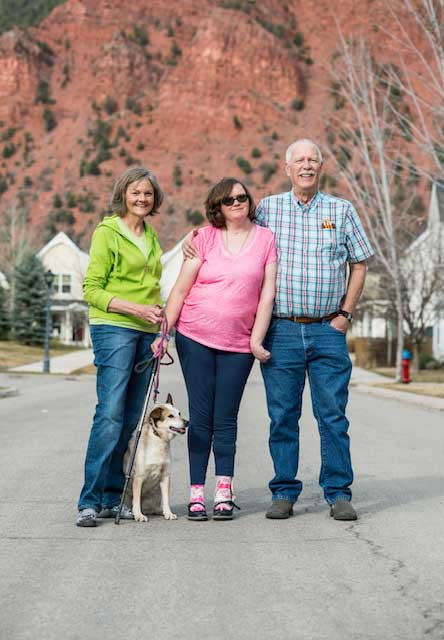
Kara, her mother Alice, and late father, Jim.
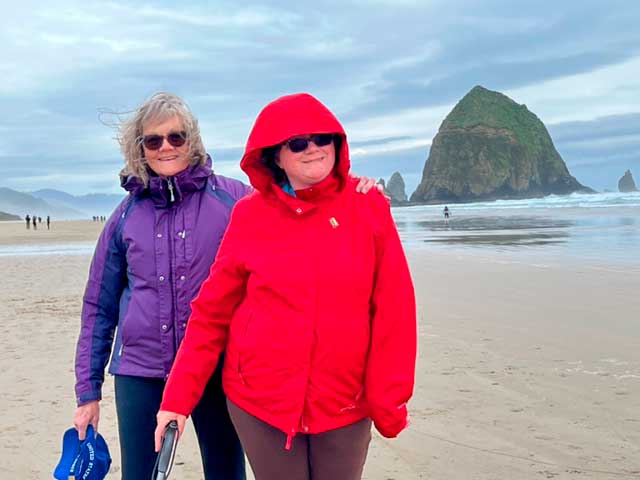
Kara and her mother Alice.
It’s been a long road for the Brouhard family, but as the years have progressed, Kara has mostly adapted to her disabilities – or, as she refers to them as her “abilities” – and is simply just who she is. In her own words, Kara says, “I threw it behind me and got on with life.”
But Alice is a bit more cautious than her daughter, especially when it comes to dealing with her ongoing seizure disorder. Kara has broken an ankle in a fall during a seizure and now wears a fall monitor that can detect if she were to fall during an episode. Even with the monitor, though, Alice is not so cavalier.
“My fear of seizures is the most difficult and makes me feel her mortality,” she says. “Her other challenges are just things she has adapted to and lives with, but the seizures through the years have been really difficult.”
Kara doesn’t let anything – including seizures, get in the way of living her best life, however. She goes therapeutic horseback riding once a week, walks almost every day, swims at the hot springs pool at least once a week, and goes hiking as she is able. But, perhaps the most amazing thing, is that Kara lives on her own with minimal in-home support from her Medicaid Home and Community Based Services (HCBS) designed to keep individuals like her out of 24-hour daycare such as a group or nursing home. Most of the Consumer Directed Attendant Support Services (CDASS) care is spent getting her out in the community once her daily needs are met during the week, with Kara pretty much on her own on the weekends. Alice hires and trains these individuals so that Kara can be as independent as possible with the right support system in place. She doesn’t have people instructing her what to do all day long or doing things for her.
“Kara has to make a lot of decisions on her own with the backup as needed,” says Alice, a retired registered nurse. “Kara made it clear from a very young age that she wanted to live her own life when she got older and that’s what she’s doing. A group home was talked about very early on as a long-term care option, but Kara refused.”
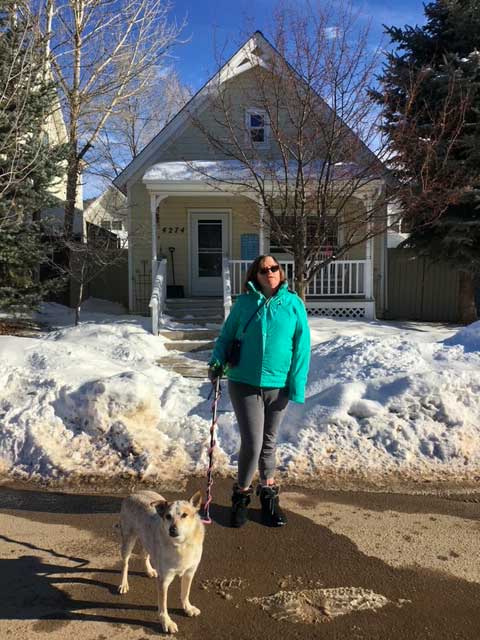
Kara poses in front of her house. She lives alone with minimal support.
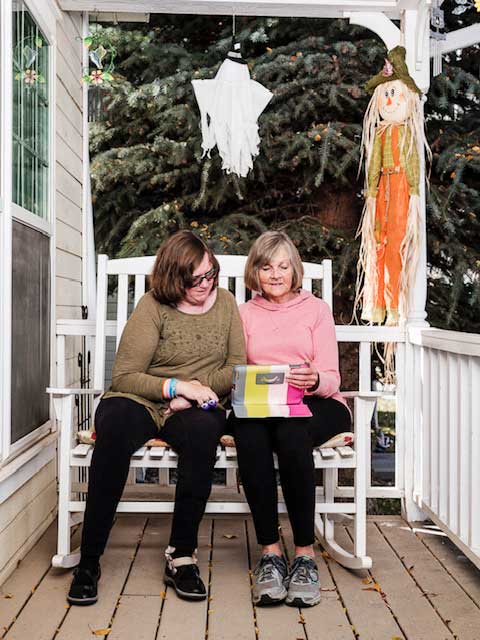
Mother and daughter enjoy Kara's front porch. Alice makes it a point to visit her daily.
Therefore, consider it to be a good thing that Kara is a self-described “bone-headed stubborn mule.” Even though she cannot read and has almost no money skills, with a little help from her support team, and interesting pieces of technology, she lives the life she wants to live. Like many individuals living with TBIs, Kara also has difficulty with time management, and for certain things, lacks the inner voice in her head that reminds her what to do. Enter the $1.99 Apple Reminder app, which allows Kara to record her own voice and tell herself what to do all day long, as the reminders go off at pre-programmed times of the day. Then, another app, Pictello, allows her to create step-by-step pictures or video/audio prompts of recipes or household tasks that need to be done. This is all in the name of helping Kara live alone.
“I don’t have any challenges living on my own,” says Kara. “I like being independent and being able to do more of what I want to do and not having people tell me what to do. I like having a neighborhood to look up to and out at. I am proud of myself. I can pretty much do what I want when I want. I plan on being an old lady drinking a margarita and rocking off my front porch one day.”
Alice adds, “Oh my gosh… it allows her to live the life she wants! For me, I know she will be okay once I leave this earth.”
While Kara does an admirable job of living her life to the fullest, her mother has always made Kara her priority. After being her primary caregiver for so many years, because of Kara’s use of technology and the independence it provides, Alice now does more oversight than direct caregiving. But she still makes it a point to visit her daughter on a daily basis.
“I go over every morning to have coffee with her,” says Alice, who describes Kara as funny and determined with a sense of humor. “She charges me $2.00 a cup as she tells me that her coffee is just as good as Starbucks and I need to pay her for it! I’m usually there for less than an hour, but on Sundays, we generally go for a long walk or a swim. I enjoy her company.”
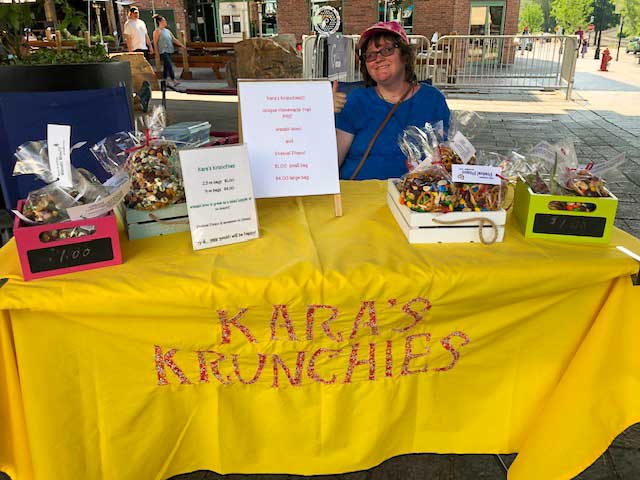
Kara's Krunchies for sale at the local farmer's market.

Kara shows off the iPad app that greatly helps her with daily tasks.
In addition to her hobbies, Kara keeps busy by volunteering at the local animal shelter, baking cookies for the police and firemen, making and selling trail mix at the local farmer’s market, and designing bracelets to sell at the Glenwood Hot Springs Pool gift shop.
“I can do a lot more than anyone ever expected,” exclaims Kara. And no better place is this exemplified than during her time spent with the BOEC. During the winter months, she zips down the hill in a bi-ski, but the summertime is her preference and is when she really shines. Kara rarely misses a yearly Challenge by Choice Adventure Retreat which is run in partnership with the Brain Injury Alliance of Colorado and features six days of outdoor adventure for survivors of an injury to the brain.
“The camaraderie and personal challenges that the BOEC offers have been such a good thing for her,” says mom. “The feeling of accomplishment after a bike ride, or a walk around the lake, or a wild party night make her feel so happy and connected.”
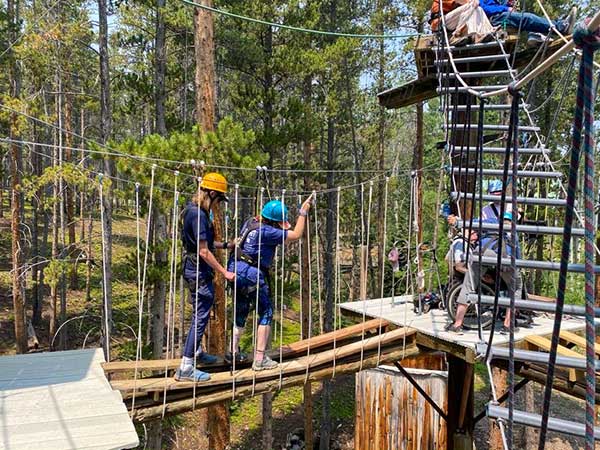
Kara traverses BOEC's high ropes course, which is fully accessible for all abilities.
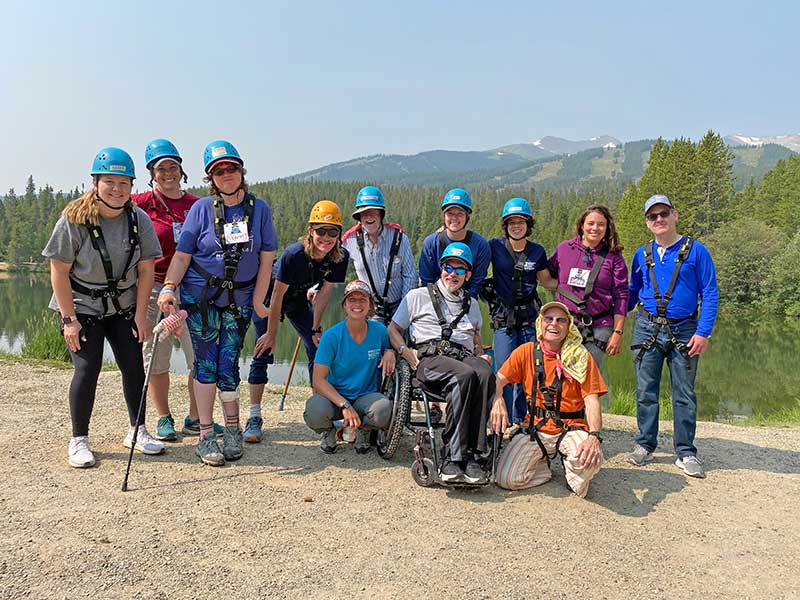
Group picture at BOEC's Challenge by Choice Adventure Retreat.
Kara credits BOEC for making her stronger, more independent, and for shaping her into who she is today in terms of challenging and doing things for herself.
“BOEC is neat and fun, and I challenge myself,” she says. “It has helped me to not be afraid to try new outdoor things. And I like to be with lots of other people too.”
And because of her rambunctious reputation, there’s even a yearly tradition that Kara points to as her favorite BOEC activity to participate in. In true Kara fashion, she mimics the scene where Forrest Gump runs through the Reflecting Pool in Washington, D.C., but in real life, it’s the high alpine Sawmill Reservoir on BOEC’s 39-acre Wilderness Site. One lucky staff member draws the short straw and gets to accompany her through the frigid water each year.
“I was the lucky staff member who accompanied Kara through the reservoir last year,” says BOEC Operations Manager Lydia North. “She periodically flirted with the idea of turning around, but something in her eyes made it obvious that it was never a real thought, but more of a checking in with me. Kara, with her neon pink monkey “Kevin” tucked into her personal flotation device (PFD), consistently encouraged us with loud ROARS. It was a highlight of my summer.”
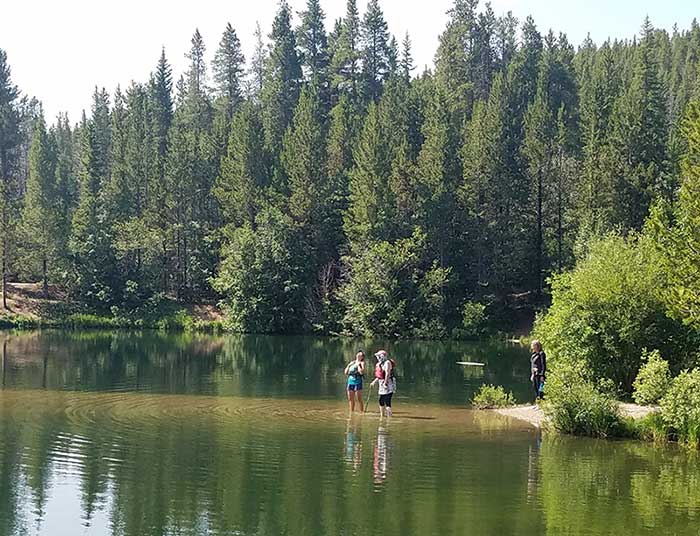
BOEC's Lydia North and Kara perform the yearly tradition of walking through the Sawmill Reservoir.
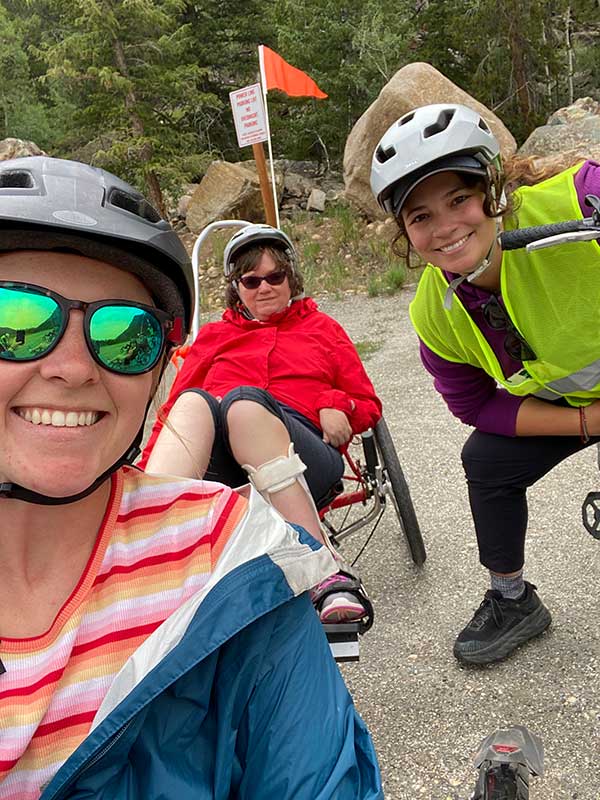
Kara poses on her adaptive cycling with BOEC staff and volunteers.
Some might say that all of this, the coma, the therapies, the doctor appointments, and the BOEC adventures have prepared her for perhaps her most courageous act to date… visiting the site of her accident this past August 2021. At 40 years old, Kara decided to hike back up to the site of her injury and confront her past. With the help of Erik Weihenmayer – the first blind person to reach the summit of Mount Everest – No Barriers, and a great team of longtime supporters, the hike was a success. This moving story is even now a documentary where, in one of its opening sequences, Producer Daniel Bedell asks Kara “How do you want people to remember you?” Kara responds, “Kara the great star of America.” As if that wasn’t enough, Daniel pushes, “Not the world, just America?” Kara is quick to respond with “Heck with it, Kara the great star of the world!”
With all she’s been through, this is not too far from the truth. While the trek up the mountain on a rainy day did not offer the best conditions for Kara and those who accompanied her, in the end, it proved to be an amazingly courageous and therapeutic experience for all those involved.
“I honestly thought that I would have strong feelings about it, sadness and some anxiety,” says Alice as she thinks back to the trip up to Kara’s accident. “But, honestly, the weather was so bad that day and yet so many people came to support us, so I didn’t have anxiety or dread once I saw all that support. My goal was just to support Kara as far as she could go and spend time being with the friends that came to hike with us.”
And once they reached the spot, Alice had a revelation. “I couldn’t be sad or morose because I was so in awe of what Kara had done to get to that spot, even with the nonstop rain, cold, and mud!”
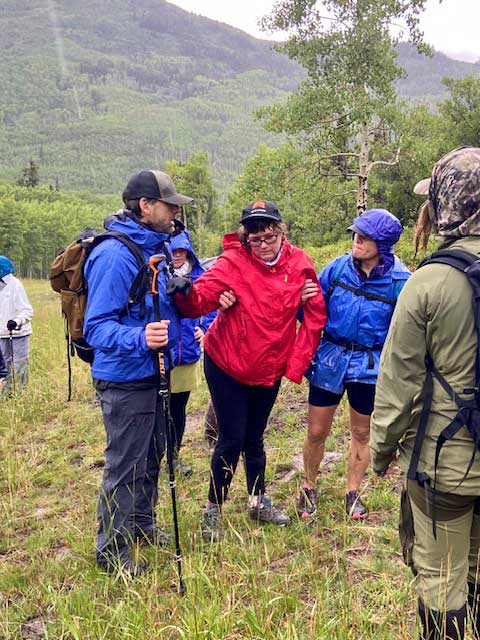
Kara is assisted by No Barriers' Erik Weihenmayer and others as she visits the site of her accident.
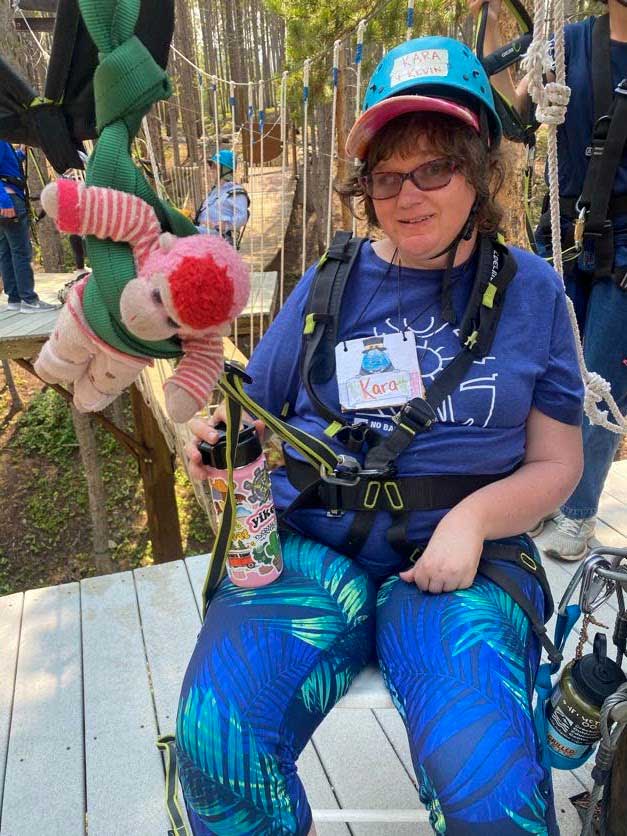
Taking a break with her monkey Kevin on BOEC's high ropes course.
Kara had always wanted to visit that dreadful spot and she finally got her wish that summer day after thinking that she would never be able to do it.
“I felt some confusion and it was hard,” she remembers, “but I had good friends and support helping me. I was angry and sad when I got to the spot, but I was very proud when I was done and glad that I went there.”
The award-winning documentary – Kara – The Star Of The World – which is now touring film festivals worldwide, illustrates Kara’s “great star of the world” status. For Alice, the film accomplishes two things in particular.
“I hope others who see it will look at the possibilities of not only setting goals but achieving them,” she says. “Not just the physical goal of getting to the top of a mountain with a disability, but also the possibilities of choosing to live your dream – for Kara – a life in her own house.”
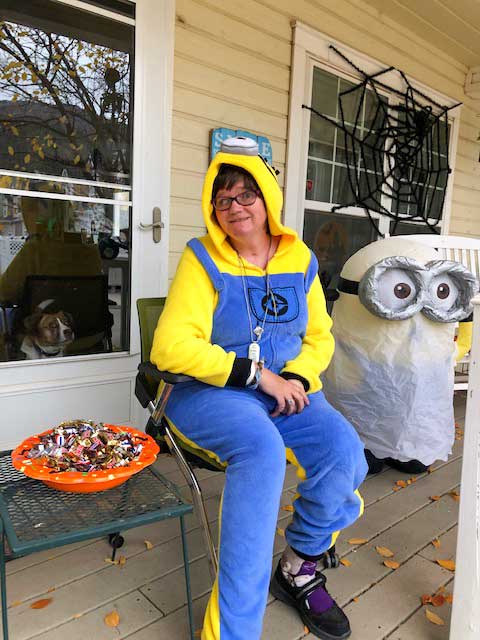
Getting in the Halloween spirit!
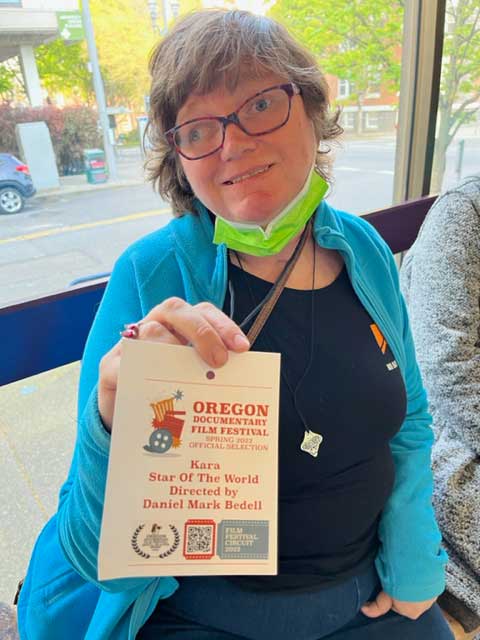
Kara shows off her Oregon Documentary Film Festival pass where her documentary film showed this summer.
After experiencing the physical and mental anguish of the trip up the mountain, when Kara had time to sit back, reflect and watch the documentary, she opened up a bit more about the experience and the film itself.
“It’s phenomenal,” she exclaims. “I feel famous, and ‘famouser’ now! I feel very proud of myself and the people that helped me on my hike. I feel like I climbed to the top of the world when I watch it!”
Top of the world as a great star of the world. We’re seeing a theme here. Kara and her family have been through so much – and accomplished so much – over the past 36 years that Leonardo DiCaprio’s proclamation in The Titanic, “I’m King of the World,” is certainly a feeling that Kara Brouhard is deserving of. She fishes, ziplines, bikes, hikes and goes whitewater rafting with the BOEC. She engages in the various aforementioned therapies and activities in her community. She lives independently and in her own house. She is able to live the life she wants, and according to Alice, BOEC has played a large role in helping Kara reach deep to face all of the challenges she’s had to overcome to get there.
“I just view Kara so much as a contributor to our community,” says Alice. “So often individuals with ‘abilities’ are seen in more of a consumer of services role, and with BOEC’s help, she is living her own life.”
“I was scared at first,” says Kara about her first BOEC experience. “But then I found I could handle it. I felt well supported by others when I was there, so I wasn’t scared.”

Kara enjoys a little creative time at BOEC's Creative Minds Retreat.
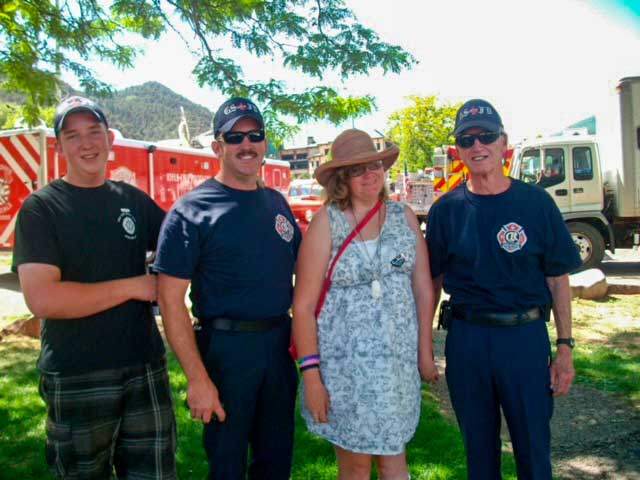
Kara regularly bakes cookies for the Glenwood Springs Volunteer Fire Department.
And when asked if she had any advice for others in a similar situation, Alice was quick to respond.
“I so believe in outdoor physical challenges that help one push through and apply what you learned to other areas of your life,” says Alice. “And that’s what the BOEC offers through its Challenge by Choice Adventure Retreats and many other programs. If you are hesitant as a participant or parent of a participant, know that you have something to offer, and don’t be afraid to try BOEC’s programs! These programs allow individuals to experience an inner strength that allows them to try other things in life.”
Kara adds, “Just put your life back together the best you can. Just do the best you can do.”
And Kara is doing just that as she continues to visit the BOEC every winter and summer to partake in what the organization has to offer while spending time with other brain injury survivors. She continues to live the best life she knows how, something that wasn’t a given on that fateful winter day in 1986 as Flight for Life transported her comatose five-year-old body to the hospital.
“Even though it may sound trite, I continue to be grateful every day that Kara is still alive,” says Alice. “Do I wish that she had never had a brain injury and could be independent on her own…of course. But I’m grateful she is here. She’s not afraid of life!”
No, Alice, she certainly isn’t!

Enjoying a little alone time on her front porch.
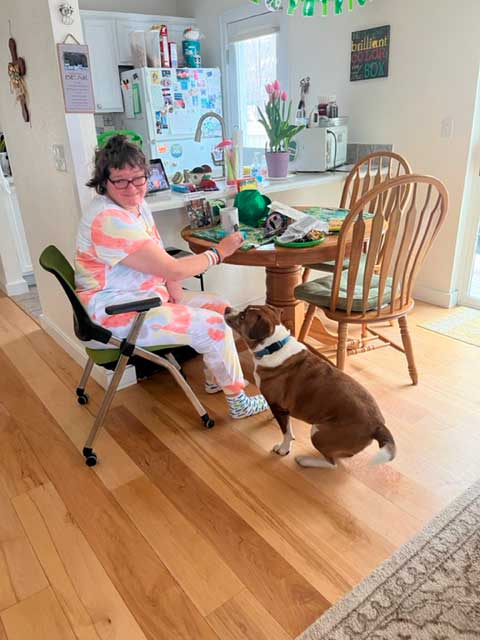
Kara being Kara!
To learn more about BOEC’s programs for individuals with brain injuries, please visit our Challenge by Choice Adventure Retreat event page.
Did you know that BOEC is able to keep its lesson fees low for participants like Kara so we can remain as inclusive as possible? We rely on generous donors to make up the difference. To make a tax-deductible gift, please visit BOEC.org/give today.
If you’re interested in how technology has helped Kara live her own life, check out Alice’s TEDx talk in 2016 about technology and Kara and some problem solving they did:

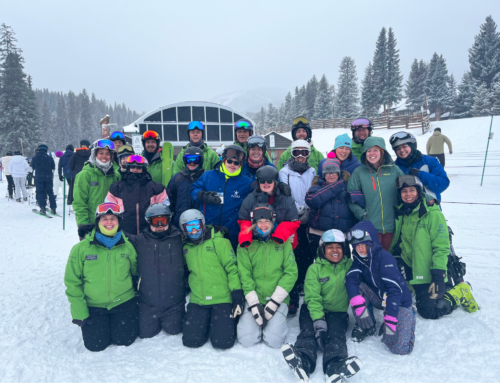
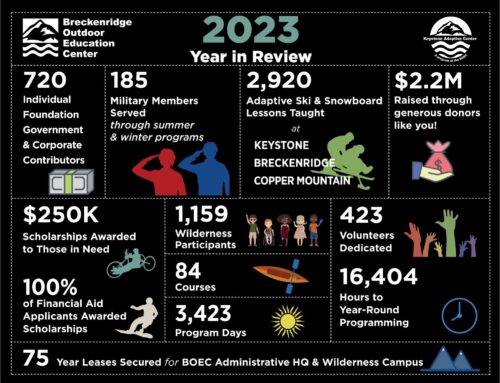
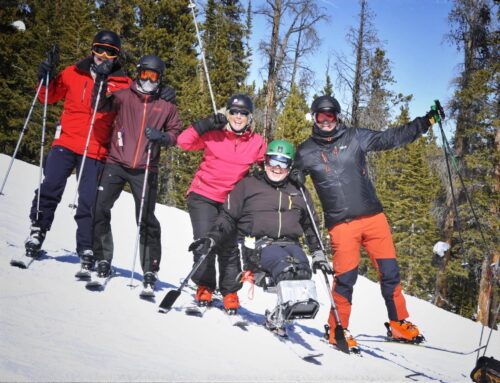

I am so sorry that you have to go through this and I will help you make a difference.
[…] I finally ordered an Amazon Echo 8 for my brother. I’m hoping to get him hooked up with it next week then we can see each other more often. I think I told you about my friend Alice who is the whiz kid with technology for the disabled. She even gave a TED talk about it. Alice has a daughter who received a devastating injury on the ski slope when she was only I’ve. We were all afraid Kara would die, or be a vegetable. However, while she does need some assistance, Alice has worked with her extensively, incorporating technology in her life and she now lives on her own in an apartment. We are all so very proud of her! Here is a beautiful story about Kara and her mother, Alice. […]